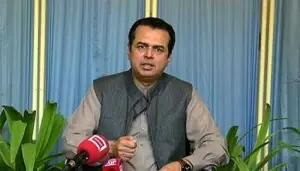Supreme Court seeks NA record on no-trust vote, hearing adjourned till tomorrow
6 min readThe Supreme Court on Tuesday resumed hearing of a suo moto case related to political crisis emerged on April 3 when the no-confidence motion against Prime Minister Imran Khan was dismissed, followed by dissolution of the National Assembly by president on the advice of the premier.
A five-member larger Supreme Court bench headed by Chief Justice of Pakistan Justice Umar Ata Bandial and comprising Justice Munib Akhtar, Justice Jamal Khan Mandokhail, Justice Ijazul Ahsan and Justice Muhammad Ali Mazhar is conducting hearing of the case.
In his arguments, Pakistan People's Party Senator Raza Rabbani said the voting on no-confidence motion could only be barred if the prime minister tendered its resignation. Otherwise once the no-trust motion was tabled in the National Assembly, voting was necessary.
Rabbani said the premier's move to dissolve the assemblies was a civilian coup, adding that the system by itself had selected an alternative for itself nad which was 'unconstitutional'.
The Senator said that the no-confidence motion against the prime minister was tabled on March 28 but the NA session was adjourned.
Quoting Prime Minister Imran Khan, Rabbani said the premier in an interview said the establishment had given him three options. However, the establishment refuted the prime minister’s claim.
Early election the best option among three 'establishment' gave me, says PM Imran
He said that the parliamentary proceedings were exempted under Article 69 of the Constitution (Courts not to inquire into proceedings of Majlis-e-Shoora, Parliament).
However, the PPP senator added that the ruling given by deputy speaker Qasim Suri had no connections with the violation of Article 5 of the Constitution. Suri himself interpreted the article and applied it on the members of lower house of the Parliament.
He further said that the ruling of the deputy speaker would be analysed under Article 95 of the Constitution that is related to “vote of no-confidence against prime minister”.
Concluding his arguments, Rabbani asked whether a National Assembly speaker could provide ruling without any findings by court.
In his arguments, Advocate Makhdom Ali Khan, who is representing Pakistan Muslim League-Nawaz in the case, said Prime Minister Imran Khan was clinging to the premiership despite losing the majority which was tantamount to an act against parliamentary democracy.
Narrating the incidents since the no-confidence motion that had signatures of 152 MNAs was submitted in the National Assembly Secretariat on March 8, Advocate Khan said the motion was submitted under Article 95 (1) of the Constitution.
On March 25, NA Speaker Asad Qaiser allowed to present the resolution which had the backing of 161 members of the Parliament and the session was adjourned till March 31, he said.
As per the Rule 37, a debate was due on the no-trust motion in the National Assembly, he said, adding, however, it was not conducted. Later, the voting was postponed till April 3.
At this Justice Munib Akhtar inquired how rejecting vote on the no-confidence motion against the prime minister was a violation of the Constitution. He remarked that within seven days of tabling the motion, the voting on it was mandatory. Whether it would be unconstitutional, if the voting to be held on the eighth day, he inquired.
Advocate Khan said the voting on the eighth day would not be unconstitutional as a strong reason for delaying the voting would have backing of Article 254 of the Constitution.
However, he said the deputy speaker had no power to dismiss the resolution and added the Assembly Rules could not superior than Article 95 of the Constitution. The deputy speaker violated the constitution, he added.
CJP Bandial ordered to submit the order of deputy speaker issued on March 31.
On Monday, the Supreme Court questioned how the NA deputy speaker could give a ruling to reject the no-confidence vote in the National Assembly on April 3.
Justice Muneeb Akhtar had observed that under Rule 28 of Rules of Procedure and Conduct of Business in the National Assembly, 2007, only the Speaker decides or gives his ruling on any matter on the floor of the House or in his office on the file. He said the deputy speaker could give ruling when the Speaker has delegated his power to him under Rule 14(4) through a written notification. He said the Speaker under Article 260 and the Rules of Procedure means the Speaker, adding the Ruling of 3rd April on no-confidence vote was beyond the jurisdiction of the deputy speaker.
Justice Muneeb had also questioned whether the speaker withdraw or modify the ruling.
CJP Bandial took a suo motu notice of the political crisis that emerged on Sunday after a session of the National Assembly - with the speaker refusing to take up the no-confidence motion citing Article 5 - was prorogued followed by the dissolution of the NA by President Arif Alvi on the advice of the premier.
The chief justice of Pakistan said that all orders and actions initiated by the prime minister and president regarding the dissolution of the National Assembly will be subject to the court's order.
Background
Earlier on Sunday Deputy Speaker Qasim Khan Suri prorogued the session after rejecting the united opposition's no-confidence motion against Prime Minister Imran Khan, terming it against Article 5 of the Constitution.
Consisiting of two clauses, Article 5 of the Constitution talks about “Loyalty to State and obedience to Constitution and law”.
- “Loyalty to the State is the basic duty of every citizen.”
- “Obedience to the Constitution and law is the [inviolable] obligation of every citizen wherever he may be and of every person for the time being within Pakistan.”
In a written order, the apex court issued notice to Attorney General for Pakistan Khalid Javed Khan on the constitutionality of the decision of the deputy speaker to dismiss the motion of no confidence on the basis of Article 5 of the Constitution. The order was issued by the three-judge bench headed by CJP Bandial comprising Justice Ijazul Ahsan and Justice Muhammad Ali Mazhar.
The chief justice observed that public order must be maintained and no state functionary shall take any extra-constitutional step in the prevailing political situation.
The chief justice accepted a request by the Pakistan People’s Party to review the ruling of NA Deputy Speaker National Assembly Qasim Suri and issued notices to the political parties, namely the Pakistan Tehreek-e-Insaf, Pakistan Muslim League-Nawaz, PPP, Jamiat Ulema-e-Islam-Fazl, Balochistan National Party-Mengal and Awami National Party, who will be heard in Monday's hearing through their counsels.
CJP Bandial directed all the political parties in the country to act responsibly and said the law and order situation should not deteriorate. “The public order should be maintained,” he added.
"No state functionaries or bodies shall take any extra-constitutional measure and shall act strictly in accordance with Constitution and the law," read the court order.
The apex court also issued notices to the Interior secretary and the Defence secretary to report the steps being taken to ensure public order, peace and tranquillity throughout the country. Assistance of the Supreme Court Bar Association and the Pakistan Bar Council was sought in these suo moto proceedings.
Meanwhile, election of new leader of the House was scheduled in a Punjab Assembly session on Sunday. However, clashes during the provincial assembly session marred the proceedings and it was adjourned till April 6.
The top court issued notice to the Punjab advocate general to examine the decision by the deputy speaker of the Punjab Assembly and the situation that has arisen as a consequence thereof. In the written order, the top court stated that the proceedings have been adjourned "without citing any reason or cause."
Ahead of the hearing on Monday, the PPP through its counsel Farooq H Naik filed a petition in the court and requested to form a full-court bench for hearing the case as it has complicated Constitutional issue that would be illustrated by all judges of the court. However, CJP Bandial dismissed the plea.
For the latest news, follow us on Twitter @Aaj_Urdu. We are also on Facebook, Instagram and YouTube.





















Comments are closed on this story.